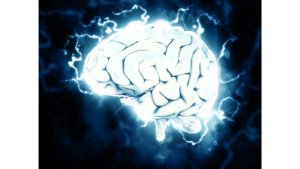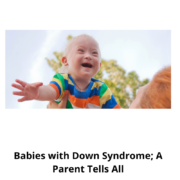Sensory Processing Disorder; An Adult’s Perspective
As an adult that developed sensory processing disorder in my 40’s I’m here to help you understand what your child may be experiencing when it comes to the world around them and how their brains are interpreting information. Not all children with sensory difficulties can articulate these feelings. As a therapist and adult who has lived through this, I deliver a unique perspective to what your child wishes you knew.

Sensory Processing
First, what exactly is sensory processing and do you have to have a diagnosis of SPD to have sensory difficulties? Our sensory system is composed of 8 sensory systems which I label below. It allows our body and brain to send/receive messages to/from each other.
In this post I discuss in detail all about sensory processing. Check it out here for more info. You don’t have to have a diagnosis of sensory processing disorder (SPD) to have sensory difficulties. Many children actually have some difficulty with processing certain sensory input. When we know what to look for we can better understand why our children are behaving in ways that may seem “bad”, “odd”, or “out of control”.
There is always a reason children are behaving the way they do. These kids often get labeled for negative behaviors when their body is actually crying out for help so they can feel more regulated. The sensory system is a super important system within our brain and body. When the sensory system is balanced then we are balanced and able to learn, focus, and live freely.
It impacts all areas of our life and later in this post I share just how huge this impact is.
As a pediatric speech-language pathologist I am a big believer in working with Occupational Therapists (OTs) to incorporate sensory activities into my therapy sessions. More often than not, sensory difficulties are an underlying link to delayed speech and language skills as well as feeding skills/picky eating. For more information on sensory processing from an amazing OT and friend of mine, check out her blog here.

What Are Our Senses?
- Visual system (seeing)
- Auditory Processing (hearing)
- Tactile Processing (touch)
- Proprioceptive system (feeling/sensations from muscles and joints of the body)
- Vestibular system (feeling of head movement in space)
- Olfactory system (Smell)
- Gustatory system (Taste)
- Interoception (regulating internal cues such as hunger, thirst, heart beat, and even autonomic nervous system activity related to emotions)
What’s My Story of Living With Sensory Processing Disorder?
I’m happy to report that I’m fully recovering from many many conditions by faithfully rewiring my brain. I’m fully recovering an acquired brain injury, brain inflammation, non-epileptic seizures, tremors, memory loss, PTSD, anxiety/depression symptoms, Lyme disease, TBRF, Babesia, Bartonella, Rocky Mountain Spotted Fever, Mycoplasma, CIRS, mold toxicity, EMF Hypersensitivity, Chemical sensitivity, sensory processing disorder, severe light sensitivity, hormone imbalances, severe limbic system dysfunction, autonomic nervous system dysfunction, and Irlen syndrome to name a few.
I developed sensory processing disorder as a result of the brain inflammation and injury to my brain from the infections. I was also diagnosed with Irlen Syndrome. Going from a healthy, thriving adult to one that was fearful of the environment around me because of how my brain and body were interpreting incoming sensory information.
Avoiding specific environments and sensory stimuli was my middle name for a few years. I became a shell of myself and scared to leave the house because I couldn’t tolerate the stimuli from the outside world.
Understanding What Children May Experience
As I dealt with SPD I would think about the children I used to work with. They all had some level of sensory difficulties and I was always careful to consult with the OT to address these difficulties in therapy. I tried really hard to watch for signs in their behavior or body language that told me they were over or under stimulated.
What I didn’t know was HOW they actually felt on the inside because most, if not all, of the sweet children couldn’t tell me HOW they felt. They didn’t have the words to articulate the feelings they were feeling. They could only show me with their facial expressions or body language which I had to interpret myself.
I didn’t realize that my interpretation was only just that, an interpretation. It didn’t even begin to explain what they were experiencing from the inside out. I believe my deepest, darkest days were actually a gift from God. Transforming my heart and mind for something bigger.
What a gift God gave me; to be able to experience what these children go through on a daily basis so I can share this experience with others. My prayer for this post is that we can begin to better understand our children and give them tools that help their systems become balanced. Then we will really see how amazing they are.
Let’s Talk The Visual System: Sight
Lights triggered seizures. Bright lights, flashing lights, glares from sunlight, lights from car lights. You name it and I was triggered. What did this feel like? It was like my brain stopped working when a car light would pass by. I couldn’t think or speak for a couple of seconds.
Can you imagine what this must feel like for a child? I think about those toys that you hold and it has a ball on the end with lights inside. When you push the button the ball and lights spin and light up. I think about the times that I would see children zone out after they use a light up toy. I know this feeling. We can’t learn if our brain is trying so hard to protect us.
Reading was difficult. Letters would swirl and move around on the page. Letters would bunch up together when trying to read or I would see black spots on the page while reading. Headaches, nausea, and anxiety were triggered by reading.
I have Irlen Syndrome which I had never heard of before this. If your child is experiencing learning difficulties, hates to read, gets tired during reading, experiences headaches, difficulty with comprehension, etc. then check out this post on Irlen Syndrome. It’s not a problem with the eyes, it’s a problem with how the brain is interpreting visual input.
Auditory Processing (hearing)
Sounds, specifically really high pitched sounds (think sounds like a whistle) or really low, deep sounds or anything that reverberated triggered seizures, tremors, or caused my brain to freeze. Thinking, talking, and memory were impacted from these types of noises.
Being at a restaurant was even difficult. People talking at the table next to us seemed as though they were talking so loud. Then add on the music, people walking past, the lights, etc and it was like I was in this bubble and could not focus at all. I would often just zone out.
I remember walking down my street and a large truck passed me and my brain froze. Feeling like I was in outer space almost. I would try to speak but couldn’t get the words out. Sometimes it would feel like I couldn’t even think, like I wasn’t really present.
Other times, I would know what I wanted to say but could not find the words. I could not get any type of speech out. It felt like I was stuck inside my head and my body. My body would tremor uncontrollably and I would have to let it pass. Afterwards I felt like I was in a brain fog and had a difficult time with word finding and with memory.
Does your child put their hands over their ears?
Think about the child you see put their hands over their ears when they hear a noise. You may see a child do this from hearing a vacuum, or an airplane, or if someone if talking loud or there is a loud/sudden noise. Their brain is interpreting this as unpleasant and even scary. Then it sends a message to the body to cover their ears, hide under something, cry, zone out, etc.
Be the curious observer for your child. Look for these behaviors and think about what just happened right before this behavior. There is a reason they are exhibiting these behaviors and they are often out of their conscious control. Children learn very quickly how to protect themselves from what feels threatening.
The job of the limbic system in the brain is to protect us. It’s the emotional/subconscious part of the brain. It’s responsible for our fight/flight/freeze response and it’s the subconscious controller of our nervous system. When it interprets something as a threat (ie: noise in this case) it’s going to try to protect us.
Tactile Processing (touch)
I couldn’t tolerate any type of touch on my neck, back, or feet for well over six months. I also experienced tremors when I was touched without knowing it was about to happen. When someone would come up from behind and touch me, my body would tremor or my heart rate would skyrocket.
This was probably the most difficult thing for me to experience because touch through back rubs or hugs is part of my love language. I love to hug on my own children but also on my sweet babies I work with.
I mention tremors occurring and heart racing but you may be wondering what was the feeling in my body? It was like ants were crawling up my spine and neck. It would send a shutter throughout my whole body. Often times from my head to my feet. Like a vibration throughout my body and even my brain. It was like a shock went through my body.
I would be able to continue to feel that touch even when it was gone which made it difficult for my brain to move onto something else. Think about this for our kids. Transitioning between activities can become difficult for them and it’s because their brains are stuck in fight/flight or freeze response.
I was able to communicate this to my family but so many children don’t have the words to articulate this. Even as an adult in my 40s it was difficult to articulate. I let them know I needed deeper pressure when being touch. No light touches what so ever.
I was becoming my own curious observer of what my body and brain needed. Many of our kids are living in a state between fight/flight and freeze. I know this feeling too well. We must become our child’s curious observer.
Proprioception & Vestibular system
Watching objects such as cars going by, kids running around, having an object come at me like a basketball, or our dog running by me would make me feel disoriented. If I tilted my head to the side or turned it I would feel woozy and my heart would start beating fast. If I laid down on my side I would feel disoriented too.
Feeling this way would make it extremely hard to focus, think, and even talk. I remember being outside and looking at our kid’s swing set. It was a spring day and I was sitting on the chair outside in nature. I decided to go sit on the swing and just enjoy being outside. I lightly swayed back and forth on the swing and immediately became dizzy where I had spots in my vision and a difficult time focusing.
Proprioception
When I tried to get up to walk, my proprioception was off and my legs were like jello. This is a great example of how our sensory system is all interconnected and one impacts the other.
Recently I was attending my daughter’s basketball game and I could clearly see a sweet little girl on the other team had difficulty with sensory processing. Luckily I have mostly fully recovered from SPD so I’m able to come and enjoy my kid’s basketball games but my heart went out to this little girl. I was also super proud of her being out there!
During the game she would flinch if the ball came towards her. I immediately remembered how it feels like objects are coming at me faster or even closer then they actually are. She also fell a lot on the court and I knew she was trying to give her joints and body the input it needed to help regulate her body and where it was in relation to the court.
Olfactory system (Smell)
Our oldest has PANDAS (by the way he is doing amazing) and when he was younger one of his symptoms was an extreme hypersensitivity to smells. There were times where he couldn’t tolerate coming to the table because of the smell in the kitchen.
He could smell something a mile away and something that smelled good to me was super over powering to him. This impacts his taste as well. He dealt with other sensory difficulties as well which led to extreme picky eating at the time. His GI system would shut down and led to decreased appetite, difficulty gaining weight, and constipation.
At the time I couldn’t really understand just how much the smell of things impacted my oldest or even made him feel until I experienced sensory difficulties myself. Smell is directly processed through the limbic system in the brain and I developed severe limbic system dysfunction from multiple Lyme Infections.
Smells became extremely irritating to my brain which resulted in headaches, anxiety, irritability, and brain fog and brain freezes.
We couldn’t have fires in the fireplace because the smell of the wood burning would make me feel like I was suffocating and coughing attacks would come. I couldn’t tolerate scents from candles, essential oils, perfumes, and laundry detergents. Headaches and brain fog would occur.
I avoided Lowes and any type of stores that had building supplies because my brain would freeze and I couldn’t think, focus, and it was difficult to speak. I would end up in a brain fog for an hour or two afterwards.
For someone with a regulated sensory system you may not even notice these smells but for someone with a dysregulated system these smells have an extreme impact on our ability to function.
Gustatory system (Taste)
I didn’t experience too much difficulty with taste but foods definitely didn’t taste that great like I was used to them tasting. My appetite was very low when I was going through this storm. As with most kids that experience difficulty with smells and other sensory processing difficulties, their taste is altered.
Smell and taste go hand in hand. All of our senses go hand in hand but especially these. Think about when you have a cold and stuffy nose. Food just doesn’t taste good or it may taste bland, right? Many kids experience this and they can also experience other unpleasant ways that food taste.
So, just because you may be regulated with your sensory system and food taste yummy to you it may be very difficult for your child to eat and feel well doing so.
Interoception (regulating internal cues such as hunger, thirst, heart beat, and even autonomic nervous system activity related to emotions)
During this difficult time in my life, I had a very difficult time keeping weight on. One, my body was working so hard to protect me and help me survive that weight was difficult to maintain. Second, my appetite was at an all time low. I was barely hungry and food didn’t taste the same as it used to. Everything seemed way too salty or I only wanted bland food like baked potatoes.
I experienced ANS disorder and my heat beat was very high throughout the day. When children experience this and anxiety their appetite and hunger cues can go down.
When children have stress and sensory processing difficulties the GI system is one of the first things to struggle. Have you had a picky eater that could go all day without eating? Many deal with constipation issues too which impacts hunger and many are dealing with a system that is in survival mode.
Keeping kids on a schedule such as offering meals and snacks about 2.5-3 hours apart can be helpful. If they don’t eat at one meal another meal is coming shortly which can allow their system time to feel hunger. Decreasing milk and juice and increasing water throughout the day and at meals is very helpful.
Many kids will fill up or prefer to drink their calories so drinking water throughout the day helps them to hopefully eat more. Water is also helpful for constipation.
How To Help Our Kids Living With SPD
If you aren’t already, become the curious observer. Start looking at behaviors your child is demonstrating and thinking about those behaviors in a different way. Start to notice your own senses and how you respond to things in your environment and in your own body.
When we become more IN our body we are able to understand more about how we are responding to the world around us. Locate an Occupational Therapist that specializes in sensory processing and ask for an evaluation. It’s never too late to seek help and it’s never too early to seek help.
Children’s brains are sponges and the earlier we seek the appropriate help for them the more we can see them flourish as they get older. I hope this post was helpful and I hope you’ve learned something that can potentially help you or your child.
Please share this post with a friend!













Leave a Reply
Want to join the discussion?Feel free to contribute!